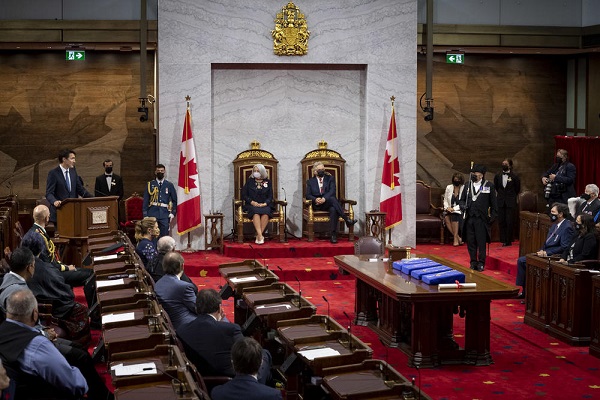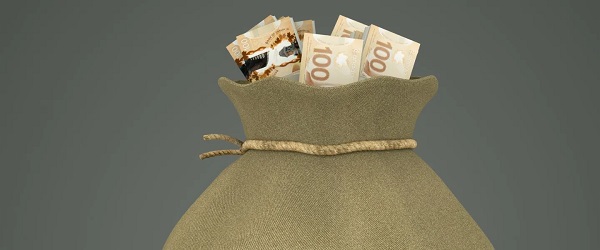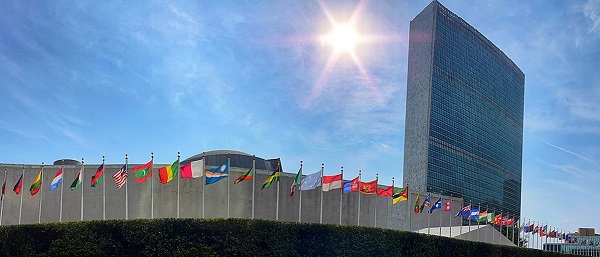National
Governor General gets $11,200 raise in 2024, third pay bump in three years

News release from the Canadian Taxpayers Federation
Author: Franco Terrazzano
The Governor General’s salary has increased by $60,000, or 20 per cent, since 2019.
Governor General Mary Simon received a $11,200 raise in 2024, her third pay bump since being appointed to the role in 2021, driving her salary for this year up to $362,800.
“Canadians are struggling to afford a jug of milk or a package of ground beef, so the government shouldn’t be rubberstamping another raise for the governor general,” said Franco Terrazzano, CTF Federal Director. “Can the government show Canadians how they’re getting more value, because the governor general’s paycheque just went up a thousand dollars a month.”
The Canadian Taxpayers Federation confirmed Simon’s salary and latest raise with the Privy Council Office.
“For 2024, the Governor General’s salary, which is determined in accordance with the provisions of the Governor General’s Act … is $362,800,” a PCO spokesman told the CTF.
The Governor General’s salary has increased by $60,000, or 20 per cent, since 2019. Meanwhile, the average annual salary among full-time workers is less than $70,000, according to Statistics Canada data.
Table: Annual Governor General salary, per PCO data
|
Year |
GG salary |
|
2024 |
$362,800 |
|
2023 |
$351,600 |
|
2022 |
$342,100 |
|
2021 |
$328,700 |
|
2020 |
$310,100 |
|
2019 |
$302,800 |
On top of the $362,800 annual salary, the governor general receives a range of lavish perks, including a taxpayer-funded mansion, a platinum pension, a generous retirement allowance, a clothing budget, paid dry cleaning services and travel expenses.
Former governors general are also eligible for a full pension, of about $150,000 a year, regardless of how long they serve in office.
Even though Simon’s predecessor, Julie Payette, served in the role for a little more than three years, she will receive an estimated $4.8 million if she collects her pension till the age of 90.
The CTF estimates that Canada’s five living former governors general will receive more than $18 million if they continue to collect their pensions till the age of 90.
Former governors general can also expense taxpayers up to $206,000 annually for the rest of their lives, continuing up to six months after their deaths.
In May 2023, the National Post reported the governor general can expense up to $130,000 in clothing during their five-year mandates, with a $60,000 cap during the first year.
Simon and Payette combined to expense $88,000 in clothing to taxpayers since 2017, including a velvet dress with silk lining, designer gloves, suits, shoes and scarves, among other items.
Rideau Hall expensed $117,000 in dry-cleaning services since 2018, despite having in-house staff responsible for laundry. That’s an average dry cleaning tab of more than $1,800 per month.
It’s also enough money to dry clean 13,831 blouses, 6,204 dresses or 3,918 duvets, according to the prices at Majestic Cleaners in Ottawa.
In 2022, Simon’s first full year on the job, she spent $2.7 million on travel, according to government records obtained by the CTF.
Simon’s travel has sparked multiple controversies, including her nearly six-figure in-flight catering tab during a weeklong trip to the Middle East, and her $71,000 bill at IceLimo Luxury Travel during a four-day trip to Iceland.
In the aftermath of the scandals, a parliamentary committee recommended a range of reforms to the governor general’s travel budget, including a regular review of the cost-effectiveness of trips, a reduction in the size of delegations and less spending on snacks and drinks.
“The platinum pay and perks for the governor general should have been reined in years ago,” Terrazzano said. “A serious government would mandate the governor general’s office be subject to access-to-information requests, cut all international travel except for meetings with the monarchy, end the expense account for former governors general, reform the pension and scrap the clothing allowance.”
Fraser Institute
Métis will now get piece of ever-expanding payout pie

From the Fraser Institute
By Tom Flanagan
The history of Ile-à-la-Crosse (IALC) in northern Saskatchewan goes back to 1776, when Thomas Frobisher established a fur trading post. Catholic Oblate missionaries arrived in 1846 and founded a small day school the next year, which was turned into a boarding school in 1860. Louis Riel’s sister Sara taught there until she died of TB in 1883. Under various names and at various locations, the school survived until the early 1970s.
The students were mainly Métis from northern Saskatchewan, with a sprinkling of Indian and white children. It was never an Indian Residential School (IRS) in the legal sense, though the federal government did at times make financial contributions proportional to the small number of status Indian children who attended. The school was mainly supported by the Oblate order and the Grey Nuns, with contributions from the province of Saskatchewan in later years.
Because the school was not an IRS, those who had attended were excluded from the IRS Settlement Agreement negotiated by Paul Martin’s government in 2005 and implemented by Stephen Harper’s government afterwards. Most students had been Métis, and the Settlement Agreement generally excluded Métis who had attended mission boarding schools that were not IRS. Wanting to share in the $5 billion financial compensation provided by the Agreement, the IALC students started legal action, using Tony Merchant’s law firm. Merchant, however, moved too slowly for the complainants, so the Sotos firm started another class action in 2022.
Following the “resistance is futile” policy enunciated by Jodi Wilson-Raybould when she was minister of justice, the federal government had already decided not to litigate, having signed in 2019 a memorandum of understanding to negotiate the claims. In March 2025, the federal government reached an agreement-in-principle with IALC students, which will go before a federal court judge for approval in January 2026. Saskatchewan announced its own agreement-in-principle in September, which will also go before the federal court.
Canada is putting up $27 million and Saskatchewan $40 million for individual compensation. With an estimated 600-700 “survivors,” this equates to individual payouts of about $100,000 apiece. This is admittedly guesswork, because neither agreement-in-principle has been published. News reports indicate that “families” will be involved in the compensation, so a larger number of claimants may materialize.
The federal news release says that compensation is being paid for “cultural loss abuse,” which includes loss of proficiency in the Cree and Michif languages spoken by the Métis in that area. Sexual and physical abuse are not mentioned, even though “survivors” claim to have been abused. Payments will be made to all who attended, as with the federal day school settlement and the “common experience” payment in the IRS settlement.
In the world of government, the joint payout of $67 million is a penny-ante affair, but the long-term implications are much greater. There are tens of thousands of Métis adults who attended mission boarding schools, both Protestant and Catholic, that were not considered IRS and were not admitted to the IRS Settlement Agreement. For them, the IALC settlement is like a dam breaking, setting a precedent for compensation. Class action law firms will commence new actions. Individual cases will be small, but there will be so many of them that the federal government will probably consolidate them into one multi-billion-dollar settlement, and the provinces will fall into line.
When Prime Minister Harper decided to implement the IRS settlement Agreement, he thought it would bring peace on the Indigenous front, allowing the government to move forward. It was an understandable hope, but in fact that decision unleashed a series of class actions that have cost taxpayers more than $50 billion and rising. When Harper was in power, he kept the lid on; but payments exploded after Justin Trudeau became prime minister in 2015 and made Wilson-Raybould minister of justice. Her instruction to Department of Justice lawyers to negotiate rather than litigate, which is still in force, caused resistance to Indigenous class actions to collapse and facilitated enormous payouts culminating in the $40 billion-plus child-care settlement. Now the Métis will get their piece of this ever-expanding payout pie.
Business
US government buys stakes in two Canadian mining companies

From the Fraser Institute
Prime Minister Mark Carney recently visited the White House for meetings with President Donald Trump. In front of the cameras, the mood was congenial, with both men complimenting each other and promising future cooperation in several areas despite the looming threat of Trump tariffs.
But in the last two weeks, in an effort to secure U.S. access to key critical minerals, the Trump administration has purchased sizable stakes in in two Canadian mining companies—Trilogy Metals and Lithium Americas Corp (LAC). And these aggressive moves by Washington have created a dilemma for Ottawa.
Since news broke of the investments, the Carney government has been quiet, stating only it “welcomes foreign direct investment that benefits Canada’s economy. As part of this process, reviews of foreign investments in critical minerals will be conducted in the best interests of Canadians.”
In the case of LAC, lithium is included in Ottawa’s list of critical minerals that are “essential to Canada’s economic or national security.” And the Investment Canada Act (ICA) requires the government to scrutinize all foreign investments by state-owned investors on national security grounds. Indeed, the ICA specifically notes the potential impact of an investment on critical minerals and critical mineral supply chains.
But since the lithium will be mined and processed in Nevada and presumably utilized in the United States, the Trump administration’s investment will likely have little impact on Canada’s critical mineral supply chain. But here’s the problem. If the Carney government initiates a review, it may enrage Trump at a critical moment in the bilateral relationship, particularly as both governments prepare to renegotiate the Canada-U.S.-Mexico Agreement (CUSMA).
A second dilemma is whether the Carney government should apply the ICA’s “net benefits” test, which measures the investment’s impact on employment, innovation, productivity and economic activity in Canada. The investment must also comport with Canada’s industrial, economic and cultural policies.
Here, the Trump administration’s investment in LAC will likely fail the ICA test, since the main benefit to Canada is that Canadian investors in LAC have been substantially enriched by the U.S. government’s initiative (a week before the Trump administration announced the investment, LAC’s shares were trading at around US$3; two days after the announcement, the shares were trading at US$8.50). And despite any arguments to the contrary, the ICA has never viewed capital gains by Canadian investors as a benefit to Canada.
Similarly, the shares of Trilogy Minerals surged some 200 per cent after the Trump administration announced its investment to support Trilogy’s mineral exploration in Alaska. Again, Canadian shareholders benefited, yet according to the ICA’s current net benefits test, that’s irrelevant.
But in reality, inflows of foreign capital augment domestic savings, which, in turn, provide financing for domestic business investment in Canada. And the prospect of realizing capital gains from acquisitions made by foreign investors encourages startup Canadian companies.
So, what should the Carney government do?
In short, it should revise the ICA so that national security grounds are the sole basis for approving or rejecting investments by foreign governments in Canadian companies. This may still not sit well in Washington, but the prospect of retaliation by the Trump administration should not prevent Canada from applying its sovereign laws. However, the Carney government should eliminate the net benefits test, or at least recognize that foreign investments that enrich Canadian shareholders convey benefits to Canada.
These recent investments by the Trump administration may not be unique. There are hundreds of Canadian-owned mining companies operating in the U.S. and in other jurisdictions, and future investments in some of those companies by the U.S. or other foreign governments are quite possible. Going forward, Canada’s review process should be robust while recognizing all the benefits of foreign investment.
-

 Alberta1 day ago
Alberta1 day agoClick here to help choose Alberta’s new licence plate design
-

 National1 day ago
National1 day agoDemocracy Watch Renews Push for Independent Prosecutor in SNC-Lavalin Case
-

 Business1 day ago
Business1 day agoOver two thirds of Canadians say Ottawa should reduce size of federal bureaucracy
-

 Business2 days ago
Business2 days agoTrump Admin Blows Up UN ‘Global Green New Scam’ Tax Push, Forcing Pullback
-

 Business2 days ago
Business2 days agoTrump Blocks UN’s Back Door Carbon Tax
-

 Media1 day ago
Media1 day agoCanada’s top Parliamentary reporters easily manipulated by the PMO’s “anonymous sources”
-

 Red Deer2 days ago
Red Deer2 days agoYour last minute election prep: Common Sense Red Deer talks to the candidates
-

 Agriculture1 day ago
Agriculture1 day agoIs the CFIA a Rogue Agency or Just Taking Orders from a Rogue Federal Government?






